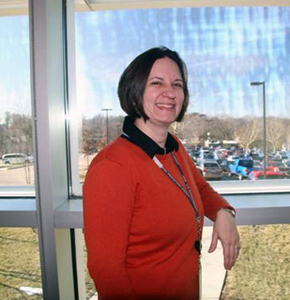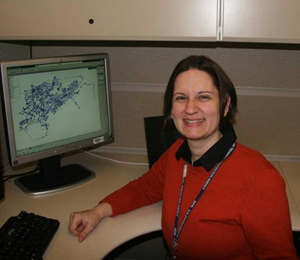Meet EPA Environmental Engineer Terra Haxton, Ph.D.

EPA Environmental Engineer Terra Haxton, Ph.D., uses computer simulation models to support Homeland Security Research to protect drinking water. She investigates approaches to help water utilities better understand the resilience of their system, and be prepared to respond to any type of disasters (natural or man-made) in their distribution systems.
In her current research, she is helping to develop the Water Network Tool for Resilience (WNTR) software—a tool that would help water utility personnel predict how their system will respond to expected, and unexpected, incidents and help inform decisions to make water distribution systems more resilient over time. WNTR can be used to estimate infrastructure damage, evaluate preparedness strategies, prioritize response actions, and identify worse case scenarios.
How does your science matter?
Clean, safe water is a basic requirement for public health and a critical contributor to prosperous and sustainable communities. Our drinking water systems are vulnerable to a variety of incidents, including contamination which can occur from aging water infrastructure; natural disasters, such as a hurricane or flood; or acts of terrorism. My research uses computer models that simulate these incidents to help water utilities understand and reduce the risks to our water supply. I use a map of a specific water utility network—the pipes, storage tanks, and other infrastructure that transport drinking water from the source to the tap—combined with a computer program called WNTR to model the flow of water and contaminants in that distribution network.
- WNTR - software that simulates and analyzes water distribution piping systems under disaster scenarios
Results from my research, and those from my EPA colleagues and our partners, help drinking water utilities enhance their resilience to disasters by planning for and understanding any potential vulnerabilities in their system, and building capacity to recover and return to service as quickly as possible.
We look at a variety of emergency scenarios, from common occurrences such as pipe breaks to less common manmade and natural disasters, such as chemical spills in source water, earthquakes, or hurricanes. Our homeland security research can be applied to a wide range of hazards so it's really helpful to water utilities.
If you could have dinner with any scientist, past or present, who would you choose and what would you ask them?
I would have liked to have dinner with Edith Clarke. I would have asked about the challenges that she faced as one of the first professionally hired female electrical engineers, and if she has any advice for how others might overcome adversity and break through barriers in their chosen career paths. I would also ask her about the development of the Clarke calculator and how computers have changed since she was a human one at AT&T.

Tell us about your background.
I went to Rose-Hulman Institute of Technology in Indiana where I received a Bachelors of Science degree in Civil Engineering. From there I went to Vanderbilt University in Nashville, Tennessee, where I received a Masters degree and Ph.D. in Environmental Engineering.
How did you get started at EPA?
While I was working on my Ph.D at Vanderbilt on the risk and reliability of drinking water systems, I became aware of EPA’s research related to drinking water security by listening to presentations at conferences. As I was completing by Ph.D., EPA posted an ORISE postdoctoral opportunity for which I applied. I started as a postdoctoral fellow in summer of 2007 and I was lucky enough that a permanent position opened up a few months later.
What do you like most about your research?
I really like it because we are helping to protect our water, a valuable asset. Most people don't take a lot of time to think about how they get their water, but there is a lot of work that goes into making sure it is clean and reliable and I feel we are helping to do this.
I also enjoy that there is always a new problem that could be solved; and computer models allow us to investigate how all the components of the water system work together.
When did you first know you wanted to be an engineer?
In middle school, I really enjoyed my science classes, so I attended a science summer camp where we took soil samples from lakes for a professor’s research project. In high school while deciding where to go to college and what degree to pursue, my mom really encouraged me to investigate engineering because it's a broad field with many opportunities to find something that suits your interests. I thought civil engineering would be the best match for someone who likes the natural and earth sciences.
Environmental protection has always been very important to me, which is why I chose Environmental Engineering for my Ph.D. Working at EPA has always been my career goal, so I'm really happy to be working here!
If you were not an engineer, what would you be doing?
I would hope that I would still be doing something in the field of science. I’ve always been interested in the Earth and rocks, so maybe a geologist.
Any advice for students considering a career in science?
Study hard and try to do well in math and science. Even if you don't become a scientist, having a strong background in math and science is very beneficial.
I would also encourage students to consider engineering. With an engineering background, you can go into almost anything. A lot of people with whom I studied engineering later became doctors and lawyers.
As a scientist there are a lot of fun and exciting things to learn and do. You get the opportunity to try many different things over the course of your career because new challenges are always presented.
Editor's Note: The opinions expressed herein are those of the researcher alone. EPA does not endorse the opinions or positions expressed.
